It’s the flurry of activity in the kitchen — piles of dishes being herded to the sink, steaming food coming out of ovens, orders being shouted over the noise of pots and pans.
For a 30-minute window on most Thursdays and Fridays, 29 students in the Advanced Culinary Arts course at Renaissance High School in the West Ada School District serve the food they have prepped all week to 25 people dining in and 20 getting food to-go. The serve around 180 meals to members of the community, their parents, school district employees and returning students.
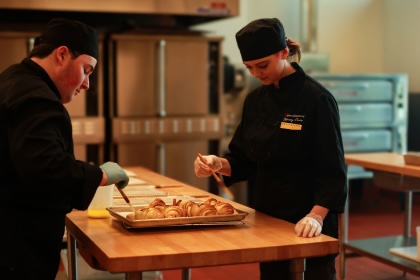
The menu today centers around “Idaho Favorites,” and specifically, potatoes, as well as blueberry potato salad, finger steaks, potato soup with potato rolls, and homemade ice cream shaped and decorated like a baked potato.
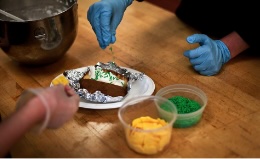
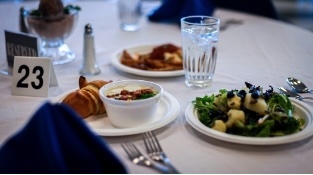
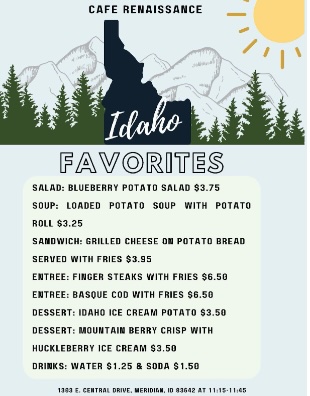
Baking and pastry instructor and program head Chef Brooke Scoville explains the cafe helps students to practice “high volume food production” without having to waste food.
With over 24 cutting boards, more than 10 different types of knives, five different blenders, several ovens, a commercial ice cream maker, a freeze dryer, ice cream scoops of all sizes, and much more, the kitchen at Cafe Renaissance is stocked for the meals they serve each week.
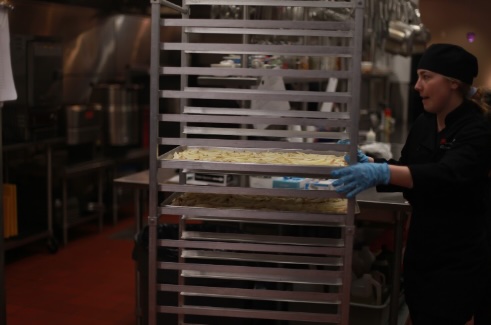
The cafe is also self-sustaining, meaning the program uses the money they make to purchase food for upcoming weeks.
Carson Metcalfe watches over 15 grilled cheese sandwiches on potato bread. Flipping them over, he talks about his plans to visit Greece after graduation where he will cook foods like baklava with a native family.
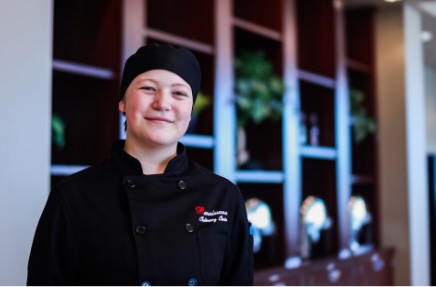
Though Carson doesn’t plan on pursuing a culinary career, he has retained a passion for it. Just that day he prepared trail mix for his friends taking high-stakes tests.
“Gift giving is how I show my love for my friends. And once I got into culinary, that translated into food specifically.” He hopes to work a culinary job to get him through college at the University of Idaho, which he will start in the fall.
Also attending the cafe that day are Scott and Lauri Swanbeck, parents of Chef Kyle Swanbeck, the newest instructor for Advanced Culinary. They said they come and order “a little bit of everything” and split it. They especially liked the potato soup. They are among several other family members eating at the cafe.
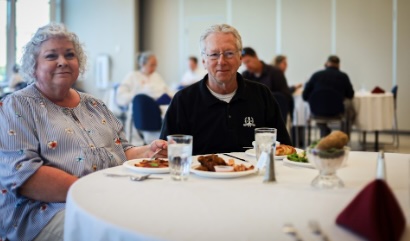
District workers also come for lunch.
The Cafe is in its 18th year according to Vern Hickman, a chef who retired last year as an instructor in the culinary program. He taught there since the beginning, and regularly stops for lunch.
Cafe Renaissance was planned into the architecture of the culinary section of the school. It sits at the edge of the building and access to the main school remains locked, allowing the cafe to serve people from the community.
Hickman says it was so innovative they had people traveling internationally from places like Israel to visit their program as they attempted to replicate it in their home countries.
Student Heidi Alderman from Mountain View High School says she likes the variety of the cafe. “It’s really fun because we have different menu items every single week.” She also likes to understand the “why” behind a recipe. “You can look at any recipe online, but knowing why it’s like that..it’s harder to find online.”
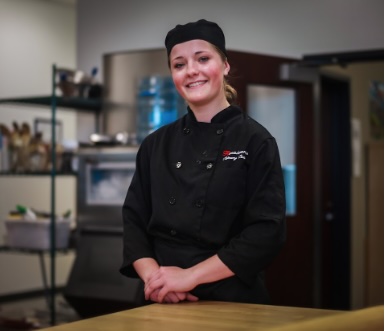
Heidi remembers watching her mom make boxed brownies, and then slowly starting to help in the kitchen. Her first experience making a cake on her own, “did not turn out very good” she remembered, laughing and explaining how the frosting on the sides was lumpy and she didn’t have the right tools. “But it was still fun.”
Heidi took the first two courses for the culinary track at her school. Then, she decided to keep pursuing the certifications and now she drives to Renaissance to take the last Advanced Culinary Arts class.
Currently, 1,338 total students from West Ada are in Food and Nutrition, Intro to Culinary Arts and Advanced Culinary Arts, the three classes offered for the culinary pathway (52% are female, 48% male).
Along the way at age 16, Heidi applied to work at Pastry Perfection, with her experience in the culinary program listed on her resume. She got the job and is the youngest worker there. She decorates designer sugar cookies and floral cakes.
She does baking as a job, but also a hobby. She just finished first in the Family, Career and Community Leaders of America (FCCLA) district baking and pastry competition, where she was tasked with baking snickerdoodles, eclairs and biscuits and decorating a cake all in three hours. She will compete in the state tournament this month.
Two years in a row, the program has had students finish in the top three in the nation for FCCLA, earning thousands of dollars in scholarships.
Though she isn’t planning on attending culinary school, Heidi plans on attending BSU in the fall for college and studying business, which she might put to use making her own baking company someday.
As part of their coursework, Scoville rotates students every two weeks through jobs like sous chef, salad, entree, etc. The task of “steward” or dishwasher is especially important because, “when you go into industry, you’re [probably] going to start in the dish pit.”
According to data provided by West Ada School District, currently 36% of Advanced Culinary Arts students indicate plans to go to culinary school, while 30% plan on going onto a culinary career.
Scovile explains that “a lot of [the students] are going to have foodservice jobs, whether it’s a career or not. The students are working in restaurants to help support themselves to put themselves through college, whatever they do after high school. Just having those skills [like time management and preparation] gives them confidence.”
Student Tim Amos agrees, saying “it’s good to have skills like communication [and] customer service, skills you use every day.”
Scoville herself got interested in pastry production after getting a fine arts degree. Living in San Francisco at the time, she would take the 5am train into the city and “bake all day long.”
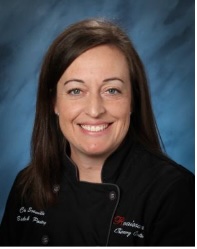
“I loved the connection to art that baking is. It’s so artistic and working with your hands. It just seemed natural to go from [an] art degree to a culinary degree.”
After moving back to Boise, Scoville got an occupational specialist certificate and started working as a teacher 12 years ago.
Renaissance High School is a hub for CTE classes in West Ada. The district has over 20 options for students looking for skills-based programs.
Each program is required to stay connected to industry professionals through a Technical Advisory Committee (TAC) who meet twice per year and make recommendations to ensure the curriculum is cutting-edge.
Scoville says this “ongoing dialogue” with those in the field helps them tweak their practices to prepare students. For example, local chefs recently recommended having students hand wash knives in the Cafe rather than putting them in the dishwasher, since that is what they would be required to do in the industry.
The culinary program just got re-accredited with the American Culinary Federation (ACF) in March, the only Idaho program to have this status. This allows the program to do their tests for certifications in-house, and adds many additional learning requirements for the students.
Students can receive the following certifications in the culinary program:
- ServSafe Food Protection Manager through the National Restaurant Association
- Workplace Readiness Assessment through the Idaho Department of Career and Technical Education
- Technical Skills Assessment in Culinary Arts through the Idaho Department of Career and Technical Education
- Certified Fundamentals Cook (CFC) through the American Culinary Federation (ACF)
- Certified Fundamentals Pastry Cook (CFPC) through the American Culinary Federation (ACF)
